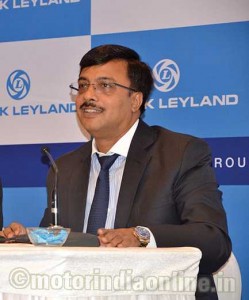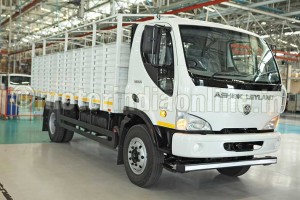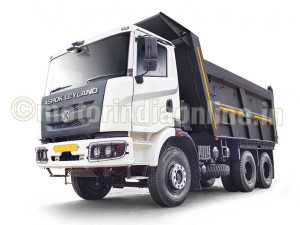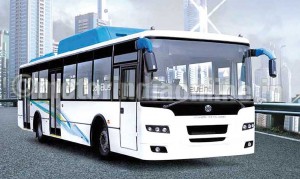
Ashok Leyland retained its market share in the domestic M&HCV space, clocking a volume of 51,830 units during FY’14. The rapid and innovative expansion of the company’s network across the country has helped improve its reach and customer satisfaction, translating to market share gains in several regions.
“In FY’14, we retained our market share in an intensely competitive M&HCV market that declined by over 25 per cent, second year in a row. We clocked a volume of 51,830 numbers in this space. The rapid and innovative network expansion has helped improve reach and customer satisfaction, translating to market share gains in several regions. While the BOSS and the Captain launches have excited the ICV and the tipper segment customers, the launch of Stile, Partner and Mitr in the LCV space have made us a complete range player. Ashok Leyland sold 28,995 vehicles in the LCV segment during FY’14, while expanding its LCV dealer network. The company exported 8,517 vehicles, despite a drastic fall in the Sri Lankan market,” said Mr. Vinod. K. Dasari, Managing Director, Ashok Leyland, presenting the annual results of the Hinduja Group flagship.
In a very tough year, the company restructured itself to reduce the overall fixed cost base while continuing to invest in new products, network, quality and sales processes. It also sold its non-core assets and reduced the working capital drastically and used the funds to reduce the debt.
“Our vision is to be in the top ten globally in M&HCV trucks and top five in buses. Though the overall industry volume declined by 25 per cent in FY’14 as against 22 per cent the year before, we were able to maintain our market share in the heavy commercial vehicle, above 16 tonnes, for more than five years. In the ICV segment, we have continued our growth path. Five years ago we were less than 5 per cent and today we have a share of nearly 15 per cent in this segment. Last few years it has been largely due to the Ecomet vehicle as well as the new launch of the BOSS vehicle”, he added.
 The truck and bus segment was very badly hit across the entire country with the haulage and tractor having the biggest drop of nearly 30 per cent. Ashok Leyland maintained its overall truck market share for the country. In buses, while the Total Industry Volume (TIV) declined by 17 per cent, AL’s LCV volumes declined by 17 per cent from around 35,000 units in FY13 to close to 30,000 vehicles in FY’14.
The truck and bus segment was very badly hit across the entire country with the haulage and tractor having the biggest drop of nearly 30 per cent. Ashok Leyland maintained its overall truck market share for the country. In buses, while the Total Industry Volume (TIV) declined by 17 per cent, AL’s LCV volumes declined by 17 per cent from around 35,000 units in FY13 to close to 30,000 vehicles in FY’14.
On the positive side, the JnNurm II scheme has given a much-needed boost for Ashok Leyland, with the company bagging 60 per cent of the orders placed thus far in different States. Though the company has dropped its share in the South and West regions, due to bad economic situation, there are some opportunities in the other parts of the country where demand might revive in 2014-15.
The company has been bullish about its new products, BOSS and Captain, and is working on leveraging its ever-expanding network and penetrate into newly identified export clusters as well. It would leverage on the success of the DOST with a new version of the product which comes with a rigid suspension. Also, the Partner which was launched with a six-tyre configuration will soon be launched in a four-tyre variant.
Accelerated transformation during downturn
 Talking about the transformation Ashok Leyland underwent during tough periods, Mr. Dasari observed: “The downtime which we are facing is an opportunity to be used to transform what Ashok Leyland was for the past many years. We need to re-structure our fixed cost, man power, material cost, enhance quality, our working capital and our dept. All this is not done suddenly but has been in practice for quite some time. It is not just about cuts, it is also about investing in new products, network, enhancing quality and delivering it, investing in R&D, bringing in more sales people.”
Talking about the transformation Ashok Leyland underwent during tough periods, Mr. Dasari observed: “The downtime which we are facing is an opportunity to be used to transform what Ashok Leyland was for the past many years. We need to re-structure our fixed cost, man power, material cost, enhance quality, our working capital and our dept. All this is not done suddenly but has been in practice for quite some time. It is not just about cuts, it is also about investing in new products, network, enhancing quality and delivering it, investing in R&D, bringing in more sales people.”
During FY’14, the company has reduced its production overheads by 33 per cent, man power cost by seven per cent (the head count now is nearly 11,500 which is its lowest in the last five years). It also re-structured its working capital to be more efficient with its inventory and receivables, in numbers from Rs. 1,100 crores four years ago to about Rs. 244 crores, a 69 per cent reduction.
 The company’s new Neptune engine has shown outstanding results with its production to be further ramped up this year. Its new Captain range has also kicked off with excellent results in terms of performance, aesthetics, quality and customer satisfaction. As for the new BOSS vehicle, over 1,000 vehicles were sold in the first six months. The new Jan Bus has also been very well received by customers with the company already bagging good number of orders. On the international front, the company’s Ras Al Khaimah facility in UAE has been expanded to increase production from four buses to eight buses per day.
The company’s new Neptune engine has shown outstanding results with its production to be further ramped up this year. Its new Captain range has also kicked off with excellent results in terms of performance, aesthetics, quality and customer satisfaction. As for the new BOSS vehicle, over 1,000 vehicles were sold in the first six months. The new Jan Bus has also been very well received by customers with the company already bagging good number of orders. On the international front, the company’s Ras Al Khaimah facility in UAE has been expanded to increase production from four buses to eight buses per day.
“We believe that the worst is over. Rather than sit back and worry about the problem that has been created by an external environment, we plan to use this opportunity to fix ourselves. We now have a contemporary range of products, truly world-class trucks, cabs and buses. We have the most expansive reach in terms of network and the highest number of touch points in the country”, concluded the MD.